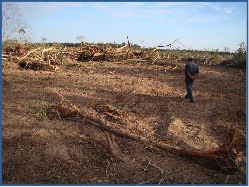FAO’s new optimistic assessment on reduced deforestation is totally misplaced say forest activists

7 September, Durban: The Global Forest Coalition[1], a coalition of Indigenous Peoples and environmental activist movements from 50 different countries has denounced FAO’s optimistic assessment that deforestation has been halved since 1990 as a false claim. FAO released its Global Forest Resource Assessment 2015 today at the World Forestry Congress in Durban, South Africa. The Global Forest Coalition said that the Forest Resource Assessment is misleading as it accepts monoculture tree plantations as “planted” forests, even though they form a major threat to the world’s biodiversity.
“We don’t want a world without forests, nor one where plantations have replaced forest. Forests have life, they are complex ecosystems. Monoculture Plantations are dead zones, green deserts, they have only one species, there is no life in them, they are often sprayed with herbicides and can never fulfill the ecological function of forests- give us clean air, water, or food,” said Carolina Lagos of the GFC member group VientoSur from Chile, one of the participants of the Fostering Community Conservation Conference that was organized by GFC the week prior to the World Forestry Congress.
The FRA 2015 shows that timber plantations have expanded with 110 million hectares since 1990. This expansion, which is increasingly driven by wood-based bioenergy demand, comes at the expense of real forests and other precious ecosystems, including grassland. Meanwhile, it claims that an area the size of South Africa in real forests was lost since 1990, but that deforestation rates have started to decline. However, a recent study[2] by the University of Maryland claims that deforestation rates have actually increased by 62%. This independent study used satellite imaging, unlike the FAO report where 98.8% of the global area reported depended on often inaccurate self reporting from governments.
This is significant given that halting deforestation by 2020 is one of the UNs soon to be adopted Sustainable Development Goals. “The adoption of the target to halt deforestation by 2020 will be a historical victory for the world’s forests and forest people, but we will continue to lose forest biodiversity as long as the replacement of forests by monoculture tree plantations is not accounted for due to the use of a flawed definition of “forests”, warns Simone Lovera, the director of the Global Forest Coalition. “Due to this flawed definition, trees have become an important threat to biodiversity, especially in countries like South Africa”,
A list of spokespersons for interviews is available on GFC’s website at https://globalforestcoalition.org/media/
Follow us on twitter @gfc123
Media contact:
Ashlesha Khadse
In Durban cell and whatsapp: +27 81 444 8399 | email: ashlesha@globalforestcoalition.org
[1] Global Forest Coalition is a worldwide coalition of almost 80 NGOs and Indigenous peoples’ organizations from 40 different countries striving for rights-based, socially just forest conservation policies.
[2] Link Kim, D.-H., Sexton, J.O. & Townshend, J.R. 2015. Accelerated deforestation in the humid tropics from the 1990s to the 2000s. Geophysical Research Letters







